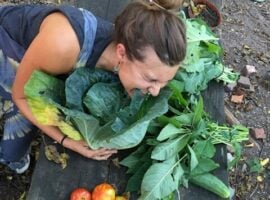Typical office-based internship experiences are not mobile and the work done, even if the work is community-focused, happens from behind the desk. Partnering with Bed-Stuy’s Campaign Against Hunger was a new and exciting experience for me and the WhyHunger Summer 18’ interns who were looking forward to learning through hands-on experience.
Historically, underserved, low-income communities in NYC experience less access to locally grown food and pantries where clients can personally select their preferred groceries. The Bed-Stuy Campaign Against Hunger (BSCAH) has stepped in to fill this gap.
Founded in 1998 as small traditional food pantry, BSCAH has grown to be the largest pantry in Brooklyn, providing critical services and access to nutritious food for their community. BSCAH’s services are wide-ranging, with them even being a first-responder to New York families affected by 2012’s deadliest mid-atlantic hurricane, Hurricane Sandy, providing emergency food, clothing, and hygienic supplies to those in need. Since then, the mobile pantry has supplied more than 1.5 million people with meals. Not to mention, BSCAH’s SuperPantry, where most of their food is stored and work is done, already holds the record for being NYC’s largest emergency food pantry as of 2018.
In addition to their emergency food work, Bed-Stuy’s Campaign Against Hunger also features a garden-space, located just down the block, near Saratoga Avenue. BSCAH’s community garden, a space very green and richly-diverse in insects, as well as crops, even features its own greenhouse! I was impressed to see all of this right in Bed-Stuy’s backyard.

The BSCAH’s garden was the second garden we 2018 WhyHunger Summer interns had visited (the first being La Finca del Sur in the Bronx.) Equipped with gloves and the guidance of some of BSCAH’s summer interns, we got to work on weeding. I noticed the diverse levels of garden knowledge that was present amongst our group while weeding. Some of us had no idea of where to start, we had some difficulty distinguishing what could and could not grow anymore. Do we pull weeds from the root? All but one of us interns had grown up in the city, and thankfully, she had ample experience growing in her own garden. Following her lead, we worked independently and as a group to remove the weeds and dead plants in each corner of the greenhouse. We later supported the BSCAH’s interns with getting the table ready to market some vegetables.

The value of working in a garden (or any space that allows you to get personal with the growing of your food) is that we as consumers take the power back from our industrialized, fast-food culture and work to nourish a relationship that has stayed alive for centuries, which is our relationship to food and the way in which food is grown. It is the BSCAH’s work around promoting environmental literacy through their Summer Youth internships and their summer camp and volunteer program, that helps embody just how very powerful knowing how to provide for yourself and your community is. It is also why I’d encourage everyone reading to reach out to their local garden, and create space to build your relationship with food, through volunteering. Providing support to emergency food providers at pantries and kitchens is an additional way to get involved and help support organizations working to ensure the right to food for communities affected by poverty and disaster.
Locally, GrowNYC is a great sustainability resource that hosts an abundance of volunteer events, curated to the neighborhood closest to you and New York Cares also has a volunteer database that features opportunities to work at all three methods of accessing food. Nationally, folks interested in volunteering can use the WhyHunger database to locate their closest emergency food provider and see what they need help with.
Go volunteer! And bring some friends. You’ll have a great time and learn something you didn’t know going in. I did!
This post was written by Armani-Marie Mendez, a rising junior at Brooklyn College studying Food and Nutritional Science. She believes wholeheartedly in empowering future generations through health equity and has worked with organizations to inspire students to create a dialogue with their communities about their sexual and mental health.






